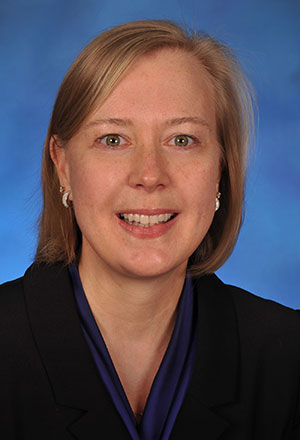Christine Barman
Principal, New Shore, LLC
BSME 1994
For significant contributions to advancements in the automotive industry such as electrical components, system design and development, while serving as an exemplary role model and mentor for young women
When Chris Barman came to Purdue, she viewed her mechanical engineering major as a path to medical school and a career as a pediatrician. But along that road were summer internships in the automotive industry, which changed her path.
“Those experiences allowed me to realize that I really enjoy solving complex problems,” she says. “With that knowledge, I decided to pursue a career in the ever-changing — and technically challenging — automotive industry.”
Barman says Purdue provided her with a strong, application-based engineering education. Her practical knowledge enabled her to hit the ground running in the workplace, where she had to assess and solve real-world engineering problems.
As a mechanical engineering student at Purdue, she says she learned to approach a difficult problem with logic and reason, and to stick with it. “Never give up. Break it down, understand it and develop a plan to succeed,” she says. “It may not work the first time, but you’ll learn. Eventually you’ll achieve success.”
One of her favorite courses at Purdue was with Professor Victor Goldschmidt: The Creative Process in Engineering, which combined engineering with cognitive psychology, fine arts, communications and group dynamics. “It introduced me to collaboration and ‘no-limits’ idea generation,” she says. “It was an extremely effective way to be introduced to innovating in engineering.”
As she explained in an interview with Crain’s Detroit Business, which named her as one of Michigan’s 100 most influential women in 2016, Barman likes to listen and observe. “Just taking the time to not only listen, but observe body language, you can gain a lot of insight in the situation and be a good leader to your team.”
In that same interview, she also encouraged young female engineers to consider the automotive industry. “There’s a perception out there that automotive is very manufacturing intensive and very low-tech. In reality, it is very high-tech, and it is a dynamic and exciting place to be.” She also urges young women to “raise your hand and volunteer for the big projects that will grow you as a person.”
For all engineering undergraduates excited about future technologies, Barman recommends a solid foundation in electronics and software. “Having a strong understanding in these areas will increase your technical competency in a future of expanding electronic integration, no matter your engineering discipline.”
Luck favors the prepared.”Edna Mode, adapted from Louis Pasteur
Career Highlights
| 2017-present | Principal, New Shore, LLC |
|---|---|
| 2016-2017 | Vice President, Electrical and Electronic Engineering, Fiat Chrysler Automobiles (FCA) North America |
| 2014-2016 | Vice President, Systems and Components Engineering, FCA |
| 2013-2014 | Unit Responsible, Electrical and Electronics Engineering, Chrysler Group LLC |
| 2012-2013 | Vehicle Line Executive, CUSW Platform, Jeep Cherokee, Dodge Dart, Chrysler 200, Chrysler Group |
| 2009-2012 | Vehicle Line Executive, E Segment Platform, Chrysler 300, Dodge Charger and Challenger, Chrysler Group |
| 2008-2009 | Director, Safety Systems and Energy Management, Chrysler Group |
| 2005-2008 | Senior Manager, Chassis Controls Systems and Driver Assistance Systems, DaimlerChrysler |
| 2004-2005 | Corporate Strategy, Special Assignment: Toyota Benchmarking Study, DaimlerChrysler |
| 2002-2004 | Supervisor, Chassis Controls Functional Integration, DaimlerChrysler |
| 2000-2002 | Senior Engineer, Chassis Controls Functional Integration, DaimlerChrysler |
| 1999-2000 | Engineer, Brake Control Systems, DaimlerChrysler |
| 1997-1999 | Engineer, Large Car Platform Brake Engineering, Chrysler Corporation |
| 1994-1996 | Engineer, Chrysler Institute of Engineering Program, Chrysler Corp. |
Education
| 1994 | BS Mechanical Engineering, Purdue University |
|---|---|
| 1996 | MS Mechanical Engineering, Oakland University |
| 2002 | MBA, University of Michigan |

